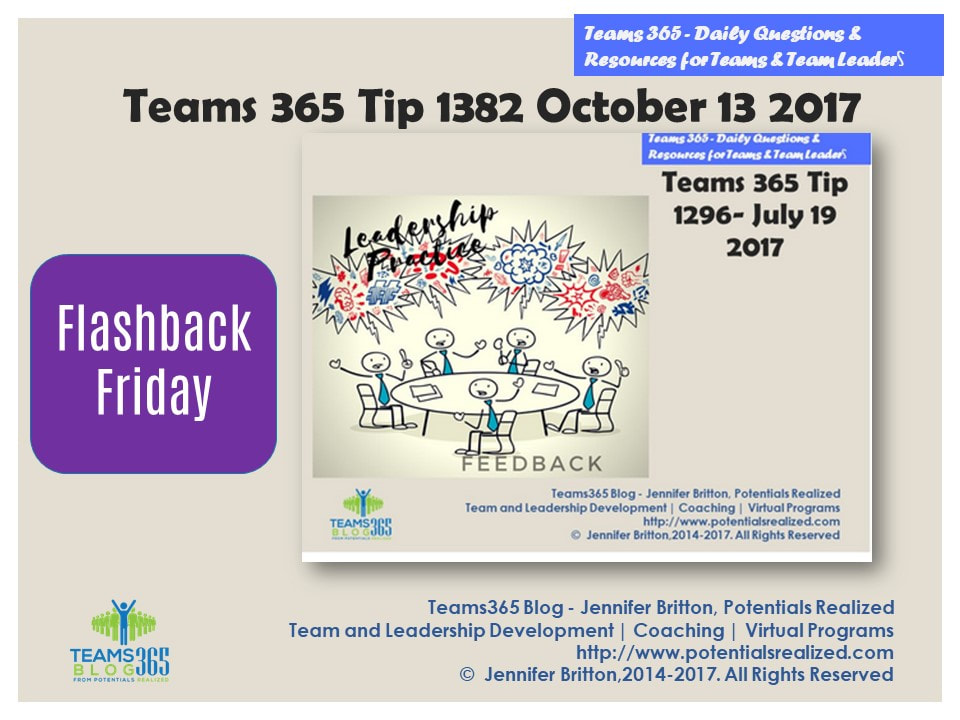Here's what I wrote in #Teams365 #1296: Leadership Practice - Feedback:
eadership Practice – Feedback
One of the areas many team leaders struggle with is providing feedback. Sometimes feedback has not been well modelled to us, or we may not operate in a feedback culture. Creating the context of regular feedback - both positive and constructive – can be an important shift in changing the way people work and interact. When feedback is sparse we may inadvertently create a culture where team members move below the radar line, and people are afraid to take risks. When we create a culture where feedback is offered on a regular basis – both positively and constructively – we are often able to take more risks and try things out in an iterative fashion.
Several keys for providing feedback include:
Make feedback regular. In moving to a feedback culture we want to make sure that we are providing feedback to our team members in both positive and constructive ways. Poor performance, or performance that is not meeting the mark should not be a surprise at formal performance evaluation moments.
Leaders alone may not be the only ones providing feedback. Building the capacity within our team to provide peer feedback can support a shift to an overall feedback culture. In building the capacity within team members to provide feedback we want to make sure that we train people in providing feedback. It can be useful to start with comments like “ I see one of your strengths as…..” or “I appreciate it when you….”. Constructive feedback from the perspective of “one thing you might want to try is…..” or “one are you may want to focus on is….”.
Be sure that in providing feedback you are speaking to observable behaviors not personality issues. A major trap in feedback is that we attribute poor performance not to things we see, but to heresay or assumptions. It is important to provide feedback on things we have seen ourselves.
Practice giving feedback in authentic ways. When feedback cultures are not established it can feel awkward to provide feedback and it may not be modeled in different voices. Providing team members with the opportunity to provide feedback using a framework mentioned in the last point, may start to build the muscle and confidence around feedback, along with a common framework with different voices.
For more posts on feedback, check out these past Teams365 posts;
Teams365 #525: Three Keys for Providing Effective Feedback. Read it here
Teams365 #1252: Preparing for the Feedback Conversation. Click here to view it: http://www.potentialsrealized.com/teams-365-blog/teams365-1252-preparing-for-the-feedback-conversation
You may also want to check out the Foundations of Feedback series I did last year in 2016.
This Friday’s post will provide an overview on 4 Essentials with Feedback: http://www.potentialsrealized.com/teams-365-blog/teams365-398-four-essentials-with-feedback
****************************************************
What is important for your team to explore right now around feedback:
- How to give feedback?
- How to prepare to receive feedback?
- Sharing how you want to receive feedback?
Best wishes,
Jennifer
Potentials Realized | Coaching Team Leaders
Team and Leadership Development | Coaching | Retreats.
Follow us on Twitter @Teams365
Phone: (416)996-8326
Looking to enhance your virtual conversations - Conference calls? Webinars? Virtual coaching work? Pick up a copy of my new book, Effective Virtual Conversations, at Amazon. You can also purchase a copy direct from our site, signed by me!

 RSS Feed
RSS Feed





